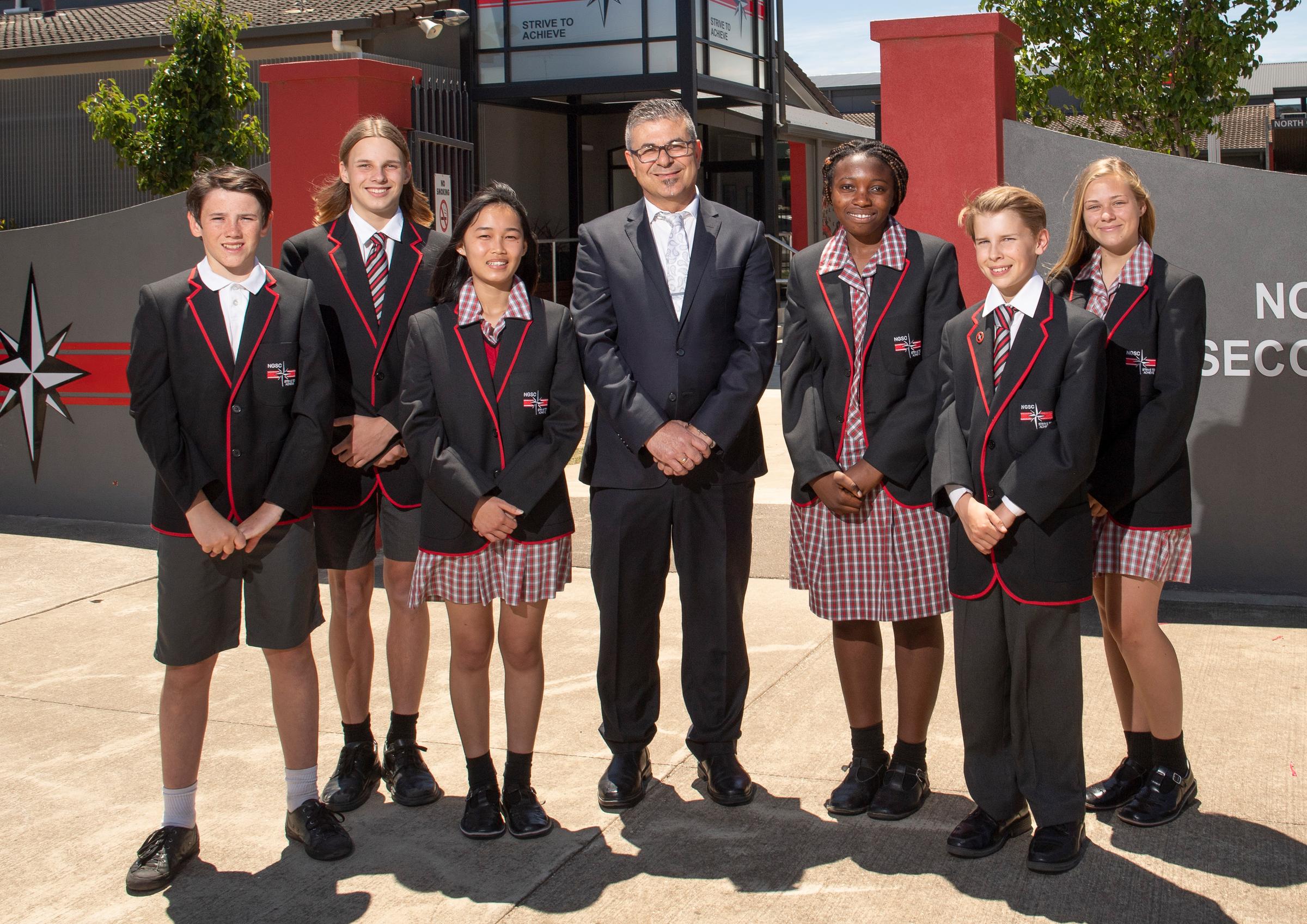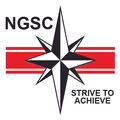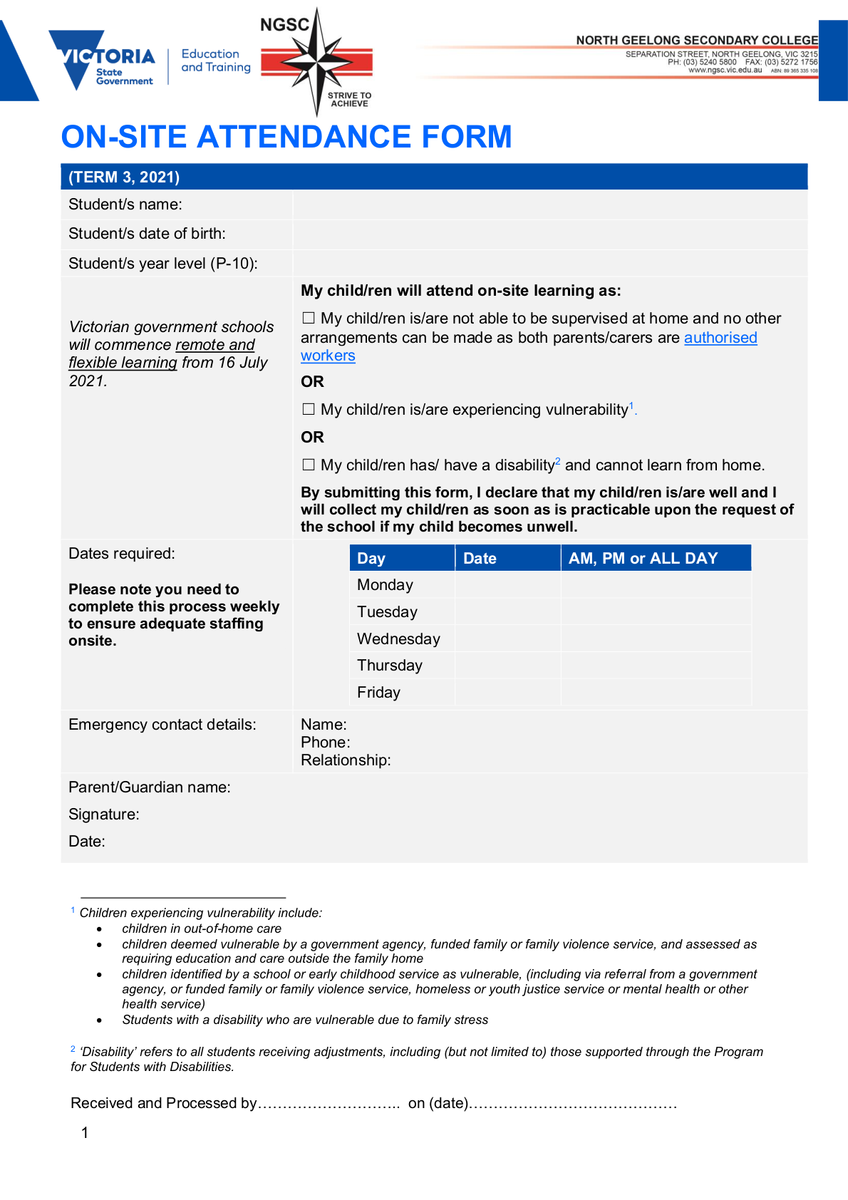PRINCIPAL'S REPORT

Nicholas Adamou
Principal
2021 Key Dates
| 26 July | Year 10 Careers Week commences |
| 27 July | Parent/Teacher Conferences ONLINE 11:30 am to 6:30 pm |
28 July to 30 July | Year 10 Careers Week continues |
| 29 July | Year 10 Course Counselling 2:00 pm to 6:00 pm |
| 30 July | Year 10 Course Counselling 8:00 am to 3:00 pm |
| 5 Aug | Year 9 Course Counselling 2:00 pm to 6:00 pm |
| 12 Aug | General Achievement Test (GAT) - Students studying Units 3 & 4 subjects |
| 6 Aug | Year 9 Course Counselling 8:00 am to 3:00 pm |
| 17 Aug | School Council Meeting commences at 6:00 pm in the Main Staff Room |
| 30 Aug | Dental Health Van Visit |
| 30 Aug | Multicultural Committee Meeting |
Welcome to Term 3
I hope you were able to enjoy some well deserved rest and relaxation over the school holidays.
Unfortunately, many staff and students were impacted by the COVID situation in other parts of Australia, disrupting much anticipated holiday time with family and friends. Despite that, I hope that everybody had a relaxing break and you’re now ready for a very busy Term. In particular the Year 12 students are coming closer to the end of their final VCE exams. I also trust that all parents and guardians have logged on to the school portal and received their children’s reports, celebrated their achievements and also discussed areas for improvements. The beginning of a Term is always a good time to reflect on the previous performance and set new goals to be achieved for the remaining of the academic year.
Any parent/guardian, who for some reason hasn’t been able to log onto the school parent portal (Compass) to receive their child’s report, I urge you to immediately contact the school to be provided with support in order to be able to receive your child’s Semester One Report.
Unfortunately, due to the recent Coronavirus outbreak, the State of Victoria finds itself, once again, in lockdown and schools are back to Remote and Flexible Learning. We are hoping to be returning to “face to face, onsite” learning next week. As you would appreciate, the lockdown has had an impact on the myriad of activities, planned for Term Three. Some activities have been postponed and some have been moved online. As we have notified all parents and students, the Parent/Teacher Conferences will go ahead online on Tuesday 27 July. I encourage all parents to book your interviews as soon as possible.
Also, during this Term, the students from Year 8 to Year 10 will undergo a subject selection process and counselling to ensure that everyone is successful in their individual pathways. At this point in time, the school is planning to provide parent information sessions and discussions in relation to supporting your children with the course counselling process. Details of these sessions (whether they will be conducted “face to face” or online) will be communicated via Compass notifications and SMS messaging. I encourage all parents/guardians to take the opportunity to be involved in the subject selection process.
I wish everyone a safe and productive Term 3.
General Achievement Test 2021, new date: Thursday 12 August 2021
Due to the current lockdown and Covid19 restrictions, we have been informed that the GAT has been rescheduled from Thursday, 29 July to Thursday, 12 August, 2021.
The rescheduling of the GAT allows schools time to organise logistics and put COVIDSafe protocols in place, so that students and staff can return onsite to participate safely.
It's important that all students have the opportunity to sit the GAT. The new date will allow students who may be impacted by school closures, quarantine and the need to self-isolate to participate in the test.
We will provide specific advice on the health and safety requirements for conducting the GAT, in line with the health advice at that time.
Extension of State-wide lockdown until 11:59 pm, Tuesday 27 July.
On Tuesday, 20 July, 2021 the Victorian Government announced the remote and flexible learning will be extended until Tuesday, 27 July 2021 inclusive.
All students continue to learn from home from 21 – 27 July.
Please note that Tuesday, 27 July is our Parent/Teacher Conferences and is a student free day. Parent/Teacher Conferences will be conducted remotely via google meetings. Please refer to your Compass feeds for details on how to make bookings.
Parents of students without a digital device or internet access, please contact Mr Dawson, Assistant Principal, (Paul.Dawson@education.vic.gov.au) to assist you immediately.
As with previous lockdown periods, our school will continue to provide onsite supervision for students in the following categories:
Children, where both parents and/or carers are authorised workers who cannot work from home, work for an essential provider and where no other supervision arrangements can be made:
- Where there are two parents/carers, both must be authorised workers, working outside the home in order for their children to be eligible for onsite provision
- For single parents/ carers, the authorised worker must be working outside the home in order for their children to be eligible for onsite provision.
Children experiencing vulnerability, including:
- children in out-of-home care
- children deemed vulnerable by a government agency, funded family or family violence service, and is assessed as requiring education and care outside the family home
- children identified by a school or early childhood service as vulnerable, including via referral from a government agency, or funded family or family violence service, homeless or youth justice service or mental health or other health service.
If your child requires onsite supervision, please fill in the “On Site Attendance Form” attached below, which is also provided on the school’s website (www.ngsc.vic.edu.au) under events or contact the school on 5240 5800 or via email: north.geelong.sc@education.vic.gov.au to ask for a form to be emailed back to you.
At this stage we expect to return to “face to face, onsite” learning on Wednesday, 28 July. Once again, thank you very much for your continued support during these very challenging times.
Reinforce COVIDSafe behaviours
Key behaviours required for reducing COVID-19 transmission risk include staying home when unwell, performing regular hand hygiene, practicing respiratory hygiene, wearing masks where required and where possible pursuing strategies to support physical distancing.
Stay home when unwell
The most important action school communities can take to reduce the risk of transmission of COVID-19, is to ensure that any unwell staff and students remain at home and get tested, even with the mildest of symptoms.
Students and staff with underlying conditions (such as hay fever or asthma)
If a student or staff member has persistent symptoms due to an underlying condition such as hay fever or asthma, the staff member or student should still be tested for COVID-19 if they develop symptoms that are different to or worse than their usual symptoms.
Students and staff should also consider getting a medical certificate from their treating GP, to confirm that it is safe for them to attend school with persistent symptoms that may overlap with some of the symptoms of COVID-19, such as cough or runny nose.
Young children with persistent mild symptoms
Younger children (Pre-School up to Grade 2) may have prolonged post-viral symptoms such as a runny nose or cough and may return to school following a negative COVID-19 test, even if they are not completely free of symptoms. They will need a medical certificate from their GP to confirm they are otherwise well or have recovered from their acute illness.
Any worsening of symptoms will require review and repeat COVID-19 testing, if considered appropriate by the doctor.
Students with a negative COVID-19 test, whose symptoms have completely resolved, do not need a medical certificate to return to the school.
For further information please see: Managing illness in schools and early childhood services during the COVID-19 pandemic.
Practise good hygiene
All staff, students and visitors to schools should undertake regular hand hygiene, particularly on arrival to school, before and after eating, after blowing their nose, coughing, sneezing or using the toilet. Staff should direct or supervise young students where required.
Sharing of food is not permitted.
Use non-contact greetings (not shaking hands, hugging or kissing).
Ensure the highest hygiene practices amongst food handlers where these services are operating, as per the Department’s Safe Food Handling Guidance.
Ensure physical distancing
A variety of strategies to support physical distancing among all students and staff should be pursued, where possible.
Staff must practise physical distancing 1.5m between themselves and other staff members or adults to the extent that is reasonably practicable. Staff should physically distance themselves from students where appropriate and feasible.
Students should practise physical distancing where possible. Maintaining a physical distance of 1.5 metres will not always be practical in the school environment. In these contexts, a combination of health and safety measures should be utilised to reduce risk.
Density limits do not apply in classrooms and other spaces for the purposes of student use, including corridors and other shared areas.
Density limits of 1 person per 4 square metres apply to staff areas, such as staff lunch rooms and areas accessed by the public, such as reception areas.
For public areas, signage must be displayed to indicate the maximum number of members of the public that may be present in the space at a single time.
Child safety in remote online learning environments
Parents and carers are responsible for their students general safety at home or elsewhere.
However, the school will continue to work closely with students and families to:
- identify risks that are reasonably foreseeable for students who are learning at home
- take reasonable steps that are in the school’s control to prevent reasonably foreseeable harm to students
Child Safety Code of Conduct
NGSC is committed to the safety and wellbeing of children and young people. Our school community recognises the importance of, and a responsibility for, ensuring our school is a safe, supportive and enriching environment, which respects and fosters the dignity and self-esteem of children and young people, and enables them to thrive in their learning and development.
This Code of Conduct aims to protect children and reduce any opportunities for child abuse or harm to occur. It also assists in understanding how to avoid or better manage risky behaviours and situations. It is intended to complement child protection legislation, Department policy, school policies and procedures and professional standards, codes or ethics as these apply to staff and other personnel.
The Principal and School Leaders of NGSC support the implementation and monitoring of the Code of Conduct, and will plan, implement and monitor arrangements to provide inclusive, safe and orderly schools and other learning environments. The Principal and School Leaders will also provide information and support to enable the Code of Conduct to operate effectively.
All staff, contractors, volunteers and any other member of the school community involved in child-related work are required to comply with the Code of Conduct by observing expectations for appropriate behaviour below. The Code of Conduct applies in all school situations, including school camps and in the use of digital technology and social media.
Acceptable behaviours
As staff, volunteers, contractors, and any other member of the school community involved in child-related work individually, we are responsible for supporting and promoting the safety of children by:
- upholding the school’s Statement of Commitment to child safety at all times
- treating students and families in the school community with respect, both within the school environment and outside the school environment, as part of normal social and community activities
- listening and responding to the views and concerns of students, particularly if they are telling you that they or another child has been abused or that they are worried about their safety/the safety of another child
- promoting the cultural safety, participation and empowerment of Aboriginal and Torres Strait Islander students
- promoting the cultural safety, participation and empowerment of students with culturally and/or linguistically diverse backgrounds
- promoting the safety, participation and empowerment of students with a disability
- reporting any allegations of child abuse or other child safety concerns to the school’s leadership
- understanding and complying with all reporting or disclosure obligations (including mandatory reporting) as they relate to protecting children from harm or abuse
- if child abuse is suspected, ensuring as quickly as possible that the student(s) are safe and protected from harm.
Unacceptable behaviours
As staff, volunteers, contractors, and any other member of the school community involved in child-related work, we must not:
- ignore or disregard any concerns, suspicions or disclosures of child abuse
- develop a relationship with any student that could be seen as favouritism or amount to ‘grooming’ behaviour (for example, offering gifts)
- exhibit behaviours or engage in activities with students which may be interpreted as abusive and not justified by the educational, therapeutic, or service delivery context
- ignore behaviours by other adults towards students when they appear to be overly familiar or inappropriate
- discuss content of an intimate nature or use sexual innuendo with students, except where it occurs relevantly in the context of parental guidance, delivering the education curriculum or a therapeutic setting
- treat a child unfavourably because of their disability, age, gender, race, culture, vulnerability, sexuality or ethnicity
- communicate directly with a student through personal or private contact channels (including by social media, email, instant messaging, texting etc) except where that communication is reasonable in all the circumstances, related to school work or extra-curricular activities or where there is a safety concern or other urgent matter
- photograph or video a child in a school environment, except in accordance with school policy or where required for duty of care purposes
- in the school environment or at other school events where students are present, consume alcohol contrary to school policy or take illicit drugs under any circumstances
IMPORTANT NOTE TO PARENTS
Whilst we welcome and encourage parents to attend the school for a wide range of reasons, it is important that all visits to the school come through our front office. Parents, guardians and visitors to the school are not to go directly to other areas of the school including different wings, classrooms or the technical support office. Our office staff will handle all parent and visitor enquiries and make the appropriate arrangements for you. Thank you for your cooperation on this matter.
Student accident insurance, ambulance cover arrangements and private property brought to schools
Parents and guardians are reminded that the Department does not provide personal accident insurance or ambulance cover for students.
Parents and guardians of students, who do not have student accident insurance/ambulance cover, are responsible for paying the cost of medical treatment for injured students, including the cost of ambulance attendance/transport and any other transport costs.
In some circumstances, medical or other expenses will be paid by the Department where it is assessed that it is likely, in all the circumstances, that the Department is liable for negligent (careless) acts or omissions of its staff/volunteers.
Student accident insurance/ambulance cover policies are available from some commercial insurers and can be obtained by school councils on a whole-of-school basis, or by parents/guardians for individual students.
Private property brought to school by students, staff or visitors is not insured and the Department does not accept any responsibility for any loss or damage.



